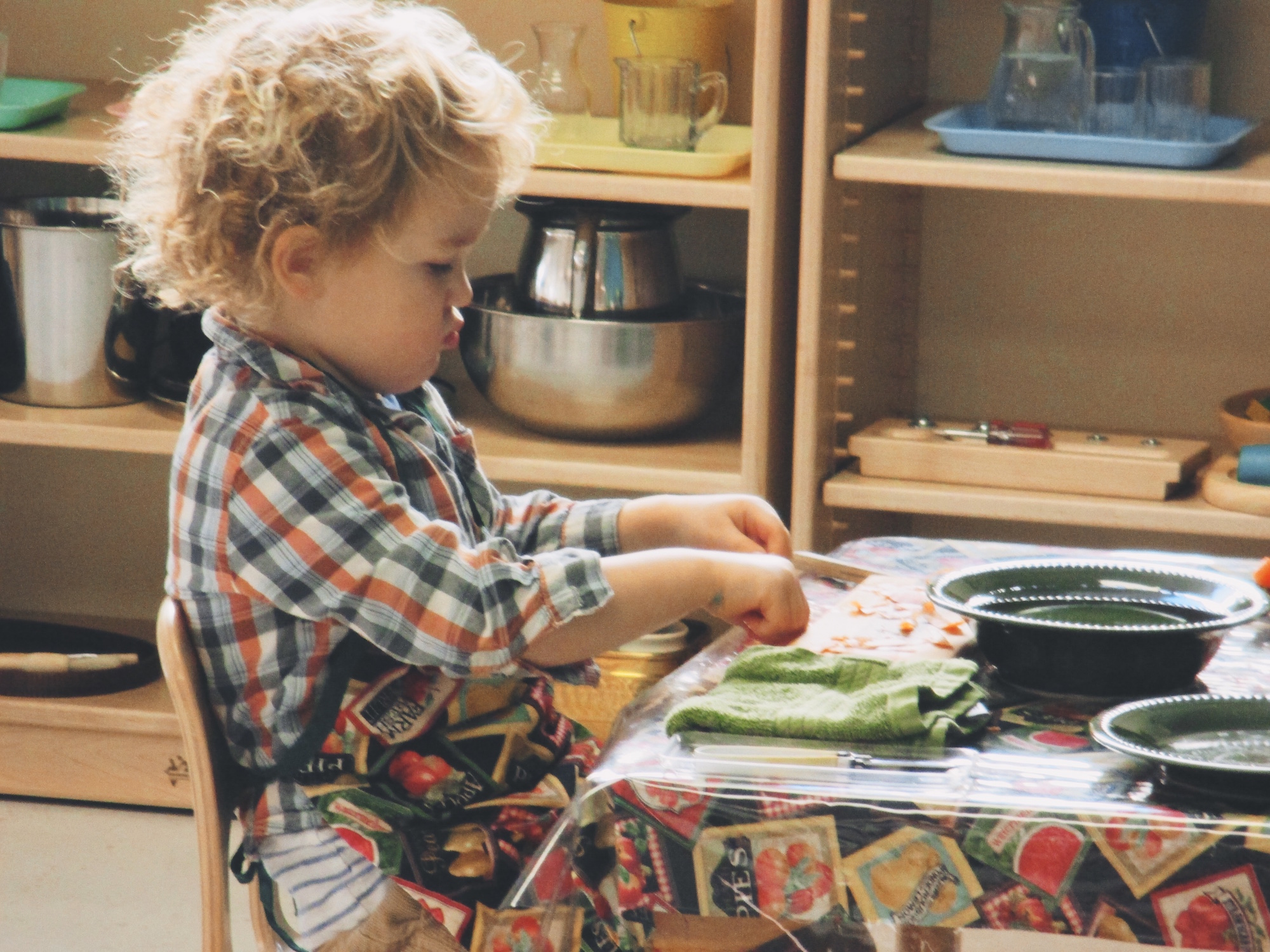Interview with Maren Schmidt
Other Good Things
We were fortunate enough to have a conversation with Maren Schmidt about her wonderful new book. Through a series of exchanges, going back-and-forth, we’re more than happy to share our dialogue here. We hope you enjoy!
What is unique about “Understanding Montessori: A Guide for Parents” is that it offers a comprehensive guide for parents, from the perspective of an accomplished Montessori parent, teacher, director and founder. It offers an accessible, readable and stimulating account, in an extremely clear manner. What special insights do you feel this uncommon viewpoint affords in the exposition of your work?
Running a good Montessori program—or doing anything well, for that matter—is not simple. Having worn so many Montessori hats I think I’ve experienced the tensions inherent in being a student, parent, teacher, school director and school founder. I’ve had to work through the pros and the cons of situations, and have learned that there is no perfect school. There is only striving for perfection.
Well-informed parents working together with well trained Montessori teachers and administrators result in better Montessori programs for our children. I think my experiences allow for realistic expectations of what our Montessori schools can be and should be.
“Understanding Montessori: A Guide for Parents” germinated with a simple, democratic intention, to “help make Montessori education available to as many children as possible”. You describe “keeping tuition affordable” as what necessitated this noble project and affirmation, but also point in the direction of reaching as many children as possible. Can you explain this motivation? What, more precisely, was the impetus of the project?
When I left the classroom a few years ago, I decided I’d focus on studying and writing about child development issues. I thought 25 years involved in Montessori work in some shape or form was enough. It was time to move on to other endeavors.
Since the early 80’s I’ve been interested in brain development. With time to read and explore current research, it became apparent to me that the Montessori way of learning and living is the most powerful way for our children to learn. Montessori activities work with children’s minds and hands at the precise critical or sensitive periods of child development to create deep understanding for the child and future adult.
In Understanding Montessori, I try to show this idea of deep understanding by explaining the child’s activity with the Pink Tower, a set of ten graduated cubes ranging in volume from one cubic centimeter to 1000 cubic centimeters. For the three-year-old it is a straightforward stacking and exploration activity. For the elementary student the Pink Tower is used to begin the bridge for understanding algebraic concepts. For the thirteen-year-old in a Montessori classroom, the Pink Tower becomes a touchstone for understanding higher mathematical concepts.
I witnessed the power of Montessori learning when I was a parent and teacher, but with this fresh outside perspective of brain research, I saw human potentialities that I could not put aside. I felt that I had, and that I still have, a responsibility to help as many people as possible understand Montessori methods and principles. It is the best way to help life that I know.
Thus the idea for a book was born.
Without question, every single child should be afforded the opportunity to learn in a Montessori classroom, regardless of their socio-economic background. Montessori is an elite form of education but it should not be just for the elite. How can we make Montessori more accessible, especially for those who are interested and committed?
The first classroom that Dr. Montessori, the Italian physician whose philosophy forms the basis of Montessori schools, was in the slums of Rome in 1907.
The idea of Montessori schools being elite is because most of them are funded by private tuitions, which indicates, as you say, parents who are very “interested and committed” to their children’s education.
We can make Montessori education more accessible by helping more people—parents and educators—really understand what Montessori education is.
Next, we need to make Montessori teacher training more available. Right now training is an impossibility for many people who are interested in becoming teachers since Montessori teacher training usually involves moving to a city that has a training center.
We also need to work to retain our teachers.
We need to have a national organization to provide guidance to new schools. Starting a school requires entrepreneurial, managerial, and technical skills, which is a difficult combination to find. New schools need support and guidance from those who have experience.
Most private Montessori schools run on less money on a per student basis than state-funded traditional schools. The initial costs for materials and training can be a stumbling block for starting a school—either private or public—but end up costing less over a ten-year period than textbooks, and other classroom and teacher costs. When you look at payback, there is no comparison. Investment in Montessori education has a huge payback in terms of human capital.
We need to encourage public school districts to create authentic Montessori programs that start with three-year-olds and continue to adulthood.
No system is ever created to accommodate everyone. There are always exceptions and singularities that escape the intended coordinates of the system. And yet, Montessori schools continue to exhibit and demonstrate unprecedented success, despite inclinations to the contrary. To what can this accomplishment be attributed?
The Montessori curriculum is developmentally exacting. The activities presented in a Montessori classroom meet the precise developmental needs of each child. Learning success follows.
We know that the critical period for language development is before the age of seven years. If you do not speak by the age of seven, you will probably never be able to communicate much above the level of a two-year-old.
Montessori lessons tap into this critical period of language by offering games where the children learn to differential the different sounds in our language (the I Spy Game). With learning to trace the Sandpaper Letters, children connect sounds and symbols, a vital skill for learning to read. The Moveable Alphabet promotes word building and helping train the eyes to move from left to right. All the card material in a classroom gives opportunities and clues for reading one word at a time, and help set in the mind an image of a word. Montessori classrooms are rich in experiences and language.
Neurobiologists are seeing that until about four-and-a-half-years, the neural connections in the brain are growing at a tremendous rate. Neural pruning begins about this time, and the connections that are used are the ones that are kept. You could say for the four-year-old: Use it or lose it. It is through activity with the mind directing the hand that deep foundational learning occurs in the child. Authentic Montessori classrooms do this better than anybody else.
Language development, as well as math, practical living skills, refinement of sensory information, social/emotional learning, and more, are richly supported by the three-year-age span of a Montessori classroom, the protected uninterrupted three-hour work period, the professionally trained teacher, and the child’s free choice of activity within the scope of the specially prepared Montessori classroom that includes the outdoors.
That’s what creates success for a child in a Montessori environment.
How would you respond to a parent that feels Montessori education simply is not for their child and they do not wish to see it incorporated on a more mainstream platform?
Let there be choices. Only about three percent of children in the United States have the chance to go to a Montessori school. A recent Harvard Business bulletin in September 2009 discussed the fact that many of the creative and entrepreneurial innovators went to Montessori school. These innovators credited their Montessori education as giving them the time and resources to explore and deeply understand an interest or problem. They learned how to learn with their Montessori experience,
In our world today, we need as many people as possible to be resourceful, responsible and respectful. Give Montessori education a chance. Give parents a choice. Give children what they truly need to learn.
What political or legislative interventions can the Montessori community enact to achieve a heightened sense of awareness of the importance of early childhood education? Collectively, should we demand more public Montessori schools? In your estimations, what are the outlines to the solution? Said differently, what are the questions that we have thus far, failed to address, let alone formulate, as a Montessori movement?
Montessori schools start as entrepreneurial small businesses. Most schools struggle like any small business and find it difficult to lend effort to a “movement”, much less find time for political and legislative efforts.
But we as Montessorians need to make school boards, and legislators, mayors and governors, mother and fathers, grandparents and aunts and uncles see that there is a way of learning and living that creates people who are self-motivated, independent, empathetic, enthusiastic, giving, honest, loving, respectful, confident, life-long learners, responsible, compassionate, resourceful, happy, and problem solving.
That’s a lot of descriptors, but Montessori education does make a difference in a big way.
“ Montessorians have failed to address the issue of inclusiveness. We need to evangelize. ”
Montessorians have failed to address the issue of inclusiveness. We need to evangelize. We have been too modest about what we do. Our world needs Montessori people in a stronger way than ever before. We need to invite others into our Montessori schools. We need to take our Montessori-ness out into the world in order to create a better world for our children and our grandchildren for seven generations.
Do you have a favorite Montessori quote?
Only one? If I have to choose I think it is this one:
“There are many who hold, as I do, that the most important period of life is not the age of university studies, but the first one, the period from birth to the age of six. For that is the time when man’s intelligence itself, his greatest implement, is being formed.”
Dr. Maria Montessori, The Absorbent Mind, page 21
Creating optimum learning situations for children before the age of six is where we need to put our focus. Dr. Montessori understood that 100 years ago. Neuropsychologists know it today. Authentic Montessori schools know how to do it like nobody else.
While Montessori appears to be extremely novel and trendy, an alternative to traditional, mainstream approaches to early childhood education, the fact of the matter is, it remains one of the most tested educational phenomenon on the planet. How can you explain this paradoxical situation?
A Montessori principle is to “Follow the child.” When you follow children you are watching for their interests and their needs. When you prepare a learning environment based on a learning continuum, which in turn is based on principles instead of methods, teaching and learning stay fresh and alive. Methods can become dogmatic but principles will light your path, generation after generation.
I’m reminded of a Ralph Waldo Emerson quote. “As to methods there may be a million and then some, but principles are few. The man who grasps principles can successfully select his own methods. The man who tries methods, ignoring principles, is sure to have trouble.”
Applying principles of learning and natural development to each child keeps Montessori work dynamic and vibrant.
One of the largest obstacles to truly understanding and appreciating Montessori has always been the misconceptions that are generated about and around Montessori schools. In your estimations, what is the single greatest misconception, or generality, about the Montessori approach to education that needs to be clarified and how can these misinterpretations be dispelled?
In my book I address twelve Montessori myths, and there are certainly more.
One myth I didn’t address is the myth of how children truly learn. When we can bust the myth of how we as human beings learn and develop, we’d see that our traditional school structure–with desks, and textbooks, and 50-minute classes with children moving from room to room isolated from the outdoors and nature–rob us of valuable experiences for true learning and meaningful relationships.
It’s the traditional schooling myth that needs to be busted. True learning is about following your passion in order to make yourself and the world around you a better place. As more people understand that, Montessori education will be understood and appreciated in the way it truly deserves.
If there is one thesis that encapsulates the ambitions of your book, “Understanding Montessori: A Guide for Parents”, it is that “authentic Montessori education is the most powerful way for children to learn in the world today”. How can we continue to promote and increase awareness of the importance of authentic Montessori education?
We cannot afford to be modest any longer. When implemented faithfully, Montessori principles, methods and techniques produce superior results when compared to other methods or styles of learning. We need to say this loud and clear.
We have to bring our Montessori-ness out into the world. We need to become leaders and not only practitioners. There are millions and millions of children in the world that are asking us, “Help me help myself.” They are seeking our leadership.
Without Maria Montessori herself around to pioneer this grand enterprise, who or what do you envision as the catalyst for the widespread dissemination of authentic Montessori education?
It’s sort of like that old Pogo comic where Pogo says, “We have met the enemy and he is us.”
If Pogo were a Montessorian, and he may be, I think he would say, “We have seen the future, and we are it.”
From your first chapter, ‘So You Keep Hearing About Montessori’, to your last, ‘Montessori Vocabulary Made Clear’, you make great strides to present a clear, concise and complete vision of Montessori. You virtually leave no stone unturned. Of course, such thoroughness is representative of the systematic and methodical nature of true Montessori education. Perhaps an interesting question would be, why is Montessori so falsely represented in the first place? Why did you feel compelled to write such a comprehensive guide to Montessori?
I don’t think Montessori is so much falsely represented, but not represented at all. Many people I know that have education degrees tell me that there was one paragraph in their college textbooks–one paragraph in five years of study—about Montessori education.
I want to get Understanding Montessori: A Guide For Parents into the hands of college teachers and college students.
We need to go out and speak at high schools and colleges. We need to invite college students in to observe our classrooms under the guidance of trained Montessorians.
Again, we have to take our Montessori-ness out to the world.
When you close your eyes and think of Montessori in the next one hundred years, what do you envision?
I see a Montessori Children’s House every few blocks with parents and children walking easily to their homes. True respect and affection between parents and children is evident.
I see elementary and adolescent programs in park like farm settings scattered throughout our larger communities. High school is eliminated because the young adult is prepared to enter into the world of business or higher learning as a confident, self-reliant individual, embarking on a journey to find his or her unique way to be of service to humankind.
I see Montessori adults problem solving together in compassionate yet realistic ways to make the best use of our resources in our homes, in our communities, in our countries, and in our world.
“Understanding Montessori: A Guide for Parents” is a comprehensive compendium, of not only helpful and insightful explanations, but also of comments and suggestions. One of the key, quintessential components to any successful Montessori education is the continuity between home and school. How can we build up these connections and unlock the doors at home?
We have to help parents see through the keyhole of possibility, then show them how to apply Montessori principles and methods in their homes.
Parents are eager to learn. Most of the time, and I speak from experience, we are overwhelmed as parents, sleep deprived, and stressed with job and family responsibilities. As parents we need digestible and usable bits of information fed to us in non-judgmental ways over a long period of time.
We’ve all grown up mostly in a world where the work of the child is not respected for the serious business it is. When we, as parents, begin to understand Montessori principles, we see the common sense of those ideas, and become eager to learn and do more.
To change our ways of thinking, speaking and acting takes time. We can’t expect to change a new parent’s 25 or 30-years’ worth of experiences and habits in a one-hour class. We have to take a partnership position and be 90 percent of the school/parent relationship until it can be 50-50.
With over twenty-five years of experience, what has been your greatest surprise and discovery?
I’m continually surprised by some of my former students. They have the courage to follow their dreams. They exhibit a verve for living that I find impressive, and enviable. C’est le joie de vivre. It is the joy of living.
Thank you so much for taking the time to participate in this brief interview. We appreciate your time, your insights, and your commitments. And, of course, we highly recommend “Understanding Montessori: A Guide for Parents”. You can also read and subscribe to Maren’s weekly syndicated newspaper column at KidsTalkNews.com.
Written by:
Baan Dek




